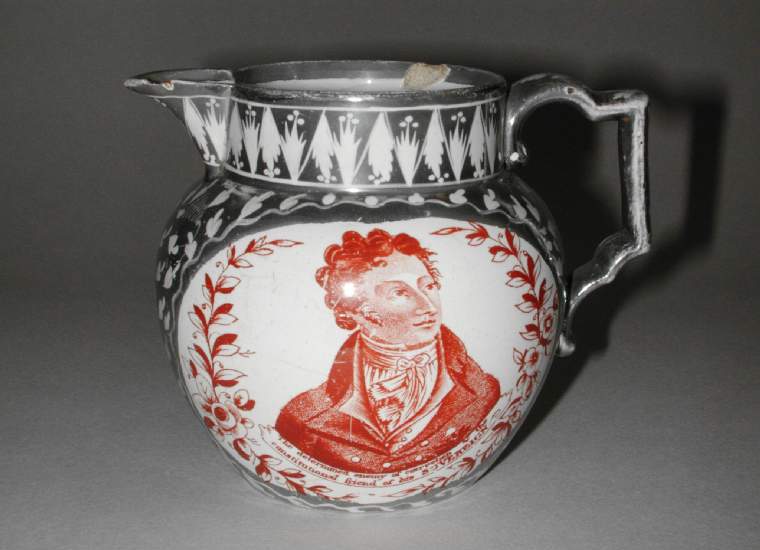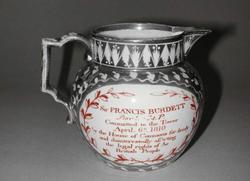Current Location: In storage
Titles
Sir Francis Burdett jug
Maker(s)
Factory:
unidentified English pottery
(Possibly)
Entities
Categories
Description
White earthenware, glazed, resist-lustred and transfer-printed in red-brown.
Jug with bulbous body, cylindrical neck, curved lip and angular handle. Decorated over-glaze on the outside with silver resist-lustre decoration and a large oval reserve on either side, each containing a red-brown transfer print. The lustre decoration includes stylized wavy sprays of foliage on the body and handle, and a repeating zig-zag with groups of three dots at the points on the neck. The rim is covered in silver lustre The underside is flat and glazed, with a raised foot-rim.
The images and text in the reserves, each contained within curved sprays of flowers and foliage, are as follows:
(i) a stippled bust portrait of Sir Francis Burdett with, below on a label: 'The determined enemy of corruption & the/constitutional friend of his SOVEREIGN'.
(ii) 'Sir FRANCIS BURDETT/Bart. M.P./Committed to the Tower/April, 6th. 1810/by the House of Commons for firmly/and disinterestedly asserting/the legal rights of the/British People'.
Notes
History note: Provenance unidentified before Sotheby's, 14 March 1911, lot 259; purchased by S. Fenton for £2 for Dr J.W.L. Glaisher, FRS, Trinity College, Cambridge
Legal notes
Dr J.W.L. Glaisher Bequest
Measurements and weight
Height: 10.6 cm
Width: 13.4 cm
Acquisition and important dates
Method of acquisition: Bequeathed
(1928-12-07)
by
Glaisher, J. W. L., Dr
Dating
19th Century, Early
George III
Production date:
circa
AD 1810
Note
Resist lustreware was typically produced by drawing, transfer printing or stencilling the design over-glaze then applying a size (perhaps a sugar and glycerine mix) to the design, with a fine brush. The jug was then coated in lustre, which only adhered to the unpainted parts. Silver lustre, made using minute deposits of platinum on a white, yellow or blue ground, was popular from around 1810-1830; and pots were sometimes coated all over to mimic Georgian silver. Pink and purple lustre was also produced, using gold. Leeds and Staffordshire were the main production centres for resist lustreware.
Sir Francis Burdett (1770-1884) entered Parliament in 1796 and campaigned against political corruption and the restriction of press freedom. In 1810 he published pamphlets supporting Gale Jones, who had been imprisoned in Newgate for publicly questioning the exclusion of the press from Parliament. This lead to Parliament committing Burdett to the Tower of London. His public arrest was carried out by a military cavalcade before an enormous mob of his supporters. Variations of the bust used on this jug also appear on other printed wares of the time, often paired with the inscriptions found here.
This type of jug was made for everyday use. The shape and size of this example suggest it may be a milk jug. The inscription indicates a date of 1810, or soon after.
Transfer printing was introduced in the second half of the 18th century, generally using the glue bat method. The design was engraved on a copper plate, which was covered with linseed oil; a thin bat of animal glue was pressed onto the oiled plate and then applied to the ware. The ware was then dusted with powdered metallic oxide, which adhered to the oil, and fired to fix the design. Round-bodied vessels were particularly well suited to this method as the flexible bat could be stretched around curves. The prints here have a few bubble-like flaws, known as ‘eyes’, caused by flecks of dust trapped between bat and body.
People, subjects and objects depicted
Components of the work
Decoration
composed of
ceramic printing colour
( red)
platinum lustre
Body
Handle
Materials used in production
slightly blue-tinted
Lead-glaze
Earthenware
References and bibliographic entries
Identification numbers
Accession number: C.1166-1928
Primary reference Number: 71444
Old object number: 3383
Stable URI
Audit data
Created: Saturday 6 August 2011
Updated: Tuesday 30 April 2024
Last processed: Tuesday 15 July 2025
Associated departments & institutions
Owner or interested party:
The Fitzwilliam Museum
Associated department:
Applied Arts





